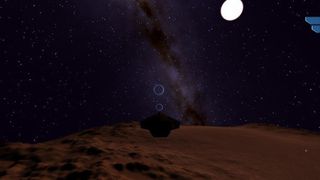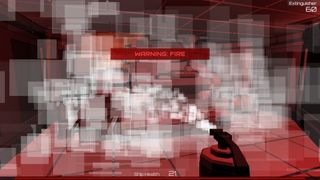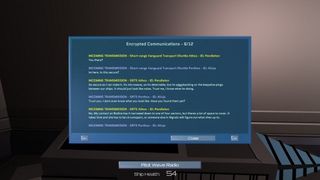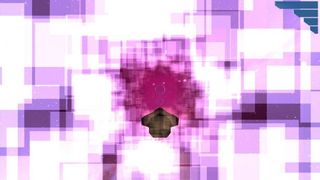Rodina review (Early Access)

Alpha and Early Access reviews offer our preliminary verdicts on in-development games. We may follow up this unscored review with a final, scored review in the future. Read our full review policy for details.
Version reviewed: 1.1.2, released August 11, 2014
Reviewed on: i5 processor, 8GB RAM, HD5770
Recommended: Quad core processor, 2GB RAM, 1GB GPU
Price: $15
Publisher/Developer: Elliptic Games
Multiplayer: No
Link: Steam store page
Open-world games fixate on the size of their worlds. Fallout 3, GTA IV, and Watch Dogs all brag about the square kilometers you'll have to explore in search of an actual plot. Enter Rodina, an open-solar system RPG. One star, four planets, and 45,000 asteroids wrapped in the soft blackness of space for you to explore. Square kilometers, meet cubic light years.
Rodina, which hit Early Access at the beginning of August, is a sandbox RPG with a familiar but engrossing sci-fi story: The Earth is all used up. Humanity has gone to the stars looking for a new solar system to call home. A colossal colony ship, the Rodina, is on its way with all of humanity on board. The main character was part of the advance party, the first fleet of colonists, sent ahead of Rodina to get things started. Upon entering the heliosphere, though, this supposedly uninhabited system is crawling with angry, laser-shooting aliens. Everyone in the vanguard dies and the Rodina, still six years away in interstellar space, scrambles to find survivors to fight back against the aliens. If the enemy can't be dealt with before the Rodina arrives, millions of colonists are never going to wake up from hypersleep, and we will be extinct.
As the sole (possibly robotic?) survivor of the vanguard, it's up to you to wage war against the aliens spread out across this unfriendly system and its four planets. Each planet is actually planet-sized, and your quest will take you through the deep space between them and the asteroid belt beyond.

There's one big problem with this setup that the game's lone developer, Bethesda veteran Brendan Anthony, has tried to solve in a clever way: space is really big. To help navigate all that distance, the ship has a manual transmission that switches 'gears' to climb exponential power levels. It's a perfect solution, and I've never controlled a spaceship engine in this way before. The soft, white puffs of gas in gear one, the docking speed gear, give way to blue plasma jets for gear two, the combat maneuvering gear. Third gear is used to travel around a planet to find enemies or crash sites. Shift up to fourth to engage the Limnal Drive and zip between planets in a few seconds.
This difference in power scales is crucial for a ship that not only crosses solar systems, but can slow down, enter an atmosphere, and land softly on alien soil. Beyond the sci-fi RPG trappings, this enormous scope is Rodina's real hook, and it works perfectly. Watching a distant planet expand until individual rocks are mucking up my landing gears makes the whole thing feel more real: those aren't art sprites in the distance that I'll get to explore after the appropriate loading screen. Those are real places, and I can go there.

Right now, the only goal is the complete eradication of all aliens. Alien ships can be found loitering like sulky teenagers throughout low orbit. Once I get within a few hundred meters, they all turn and fly for me, launching heat-seeking missiles and hosing me with laser spray. I found these dogfights to be chaotic, white-knuckle scraps at first. The ship's controls are perhaps a little too simple: WASD control forward, left, right, and backward movement, and pointing with the mouse and gunning the engine forward is about as complicated as it gets. Sliding to the left or right came in handy during a dogfight or two, but it's definitely optional. Unfortunately, the enemies and their tactics are identical across all four planets, so I found myself repeating the same shooting gallery a couple hundred times. The solar system's tremendous size is hamstrung by its lack of variety: it has been stocked for my enjoyment, like an artificial lake.
PC Gamer Newsletter
Sign up to get the best content of the week, and great gaming deals, as picked by the editors.
Once on the ground, my mission is recover supplies from destroyed vanguard ships. While looting crates of missiles and ship upgrades, glowing data sticks and emails are found, which contain the scattered threads of Rodina's story. And here's the really unexpected thing: they're fantastic. Each one is a fast-reading, inventive sci-fi short story. Once, I found chat logs between a husband and wife in separate life pods, trying to survive and keep track of each other during the alien attack. Another thread featured a daily staff meeting where the crew chief was getting chewed out. His offense: he posted erotic dream transcripts of hypersleeping passengers to a public forum, violating the intimate privacy of the passengers in his care.

If flying to distant planets and walking around on asteroids is Rodina's opening band, these story threads are the headliner. They're funny, touching, and engaging. I stop everything to devour each new one, and when I land at a salvage site I'm hoping for part 3 of the husband/wife story more than I want to find a crate of heat-seeking missiles.
The writing and travel are good bones, but there's no flesh on them yet; there's no role-playing in this role-playing game. After a couple of ship upgrades, it's entirely about surviving dogfights and scrounging for supplies. The inside of my ship provided some interest: the interior is explorable from a first-person viewpoint, so I wandered the halls and checked out my bedroom, desk, and the impressive-looking bridge. Exiting via the rear airlock reveals the rocky, barren surface of whatever asteroid or planet I've come to rest on. Though the inside of the ship is a great dimension to have, it's not deep enough yet: there's no first-person combat, no NPCs, cities, plants, or animals to see. I can't sleep in my bed or look up old stories at my desk. The bridge looks great, but only the captain's chair, which starts the ship's pilot mode, has a meaningful use so far.
Once the game is updated with hard choices and talkative NPCs, as the developer's Steam page claims it will be, there will be so much more for Rodina to explore. There's the idea that rich passengers got to sleep through the interstellar journey while the working poor piloted, cleaned, and lived and died as part of the crew—class resentment is welded into every nut and bolt aboard the Rodina. There's the idea that these damn, dirty aliens are actually the natives, and you are the marauder, the invader, the Being From Another World. Can you casually commit xenocide? Can you let humanity go extinct? These are choices on a scale that classic RPGs would be envious of, but they aren't choices yet. It's too early.

I was also not a fan of the overall art style, which straddles the line between crude placeholder and stylized, purposeful blockiness. The asteroids and planets have the samey, desolate look of procedurally generated balls of rock due for a more thorough art pass. I assume that some of it will be refined, but it's not clear how much of the game is planned for an overhaul. And to be fair, some of the effects, like flames and onboard fire extinguisher fumes, work well.
My reservations reflect more on the nature of Early Access titles than on Rodina specifically, but still: an open world is no fun if it's an empty world. It's like getting to see Morrowind before it was filled out with cities and an inventory. Is the land cool? Sure, but what comes next will make all the difference between a hollow experience and a gripping RPG.
If someone offered me the chance to walk around in the next Elder Scrolls game right now—so early in its development that there would be nothing there but empty landmass—I don't think I would do it. The things I would see and do would change the way I felt about a game that could one day become something great. That's how Rodina makes me feel. I'm glad it works and I'm enthusiastic about so many of its goals, but in some ways I wish I'd waited until it was closer to being finished.
Verdict
An ambitious but repetitive shooting gallery with deep story beats, Rodina's solar system is a great setting for the game to fill. Buy it now if you want to support the developer, but don't expect to fall in love with it yet.
Outlook
Great. The developer hopes to make the game “Daggerfall in space,” and he's got the writing talent to actually do it. The game will eventually have settlements, NPCs, and the ability to board NPC ships. It is remarkably bug-free at this stage and can, technically, be played from start to finish.
